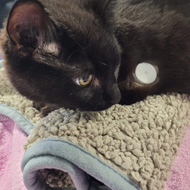
Shadow is in diabetic remission after being fitted with the Bluetooth device.
A cat that developed diabetes from severe pancreatitis is set to make a full recovery, thanks to a glucose monitor fitted by specialists at the Royal (Dick) School of Veterinary Studies.
Ten-year-old Shadow presented to the School's Hospital for Small Animals as an emergency case, with free fluid in her chest and abdomen. The team quickly stabilised Shadow, and diagnosed her with severe pancreatitis and vasculitis, but she sadly also developed diabetes.
To monitor her condition, and following consultation with her primary vets and owners, the Internal Medicine team fitted Shadow with a permanent glucose-monitoring device.
The device enabled Shadow's owners to take her home and measure her glucose levels through a Bluetooth reader. Shadow's blood glucose readings were then relayed back to the researchers, who adjusted her insulin as needed.
Three months since being referred to the specialists, Shadow's pancreatitis has subsided, and she is in diabetic remission, with no more need for insulin. Her free fluid is gone, and she no longer requires a diabetic diet.
Shadow is still recuperating at home, and her glucose monitor has been removed. She does not require any more rechecks with the Internal Medicine Service, but she will be regularly evaluated by her primary care vet.
Silke Salavati, a senior lecturer in small animal internal medicine, commented: “These modern glucose monitors are invaluable when tracking an individual pet’s glucose levels in real-time. It can be done by the owner at home with minimum stress to the patient.
“The detailed information they provide vets has vastly improved how we can monitor diabetic animals and treat them accurately with insulin. These devices increase the chances of cats successfully achieving diabetic remission and we are delighted that Shadow is doing so well.”
Image (C) University of Edinburgh.



 The Veterinary Medicines Directorate (VMD) is inviting applications from veterinary students to attend a one-week extramural studies (EMS) placement in July 2026.
The Veterinary Medicines Directorate (VMD) is inviting applications from veterinary students to attend a one-week extramural studies (EMS) placement in July 2026.